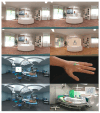Virtual Reality-Assisted Informed Consent for Anesthesia: A Prospective and Randomized Proof-of-Concept Study
- PMID: 39458046
- PMCID: PMC11509058
- DOI: 10.3390/jcm13206096
Virtual Reality-Assisted Informed Consent for Anesthesia: A Prospective and Randomized Proof-of-Concept Study
Abstract
Background/Objectives: Informed consent for anesthesia poses both legal challenges and problems of understandable communication. Fulfilling all the requirements through anesthesiologists directly interacting with patients is a time- and staff-consuming strategy. Given today's smart technologies, notably including virtual reality (VR), we explored in a prospective randomized study whether 'VR-assisted informed consent' could improve this situation. Methods: Fifty patients scheduled for orthopedic surgery were randomized. In the control group, informed consent was obtained via patient-specialist dialogs only. The patients in the study group, wearing a head-mounted display, watched an 8 min immersive 3D movie with the standard explanations of general anesthesia, followed by a patient-specialist dialog to address open questions. The time spent on the dialogs in both groups was evaluated as the primary outcome variable. As secondary variables, we analyzed both a three-item Likert scale on patient satisfaction with the VR experience and cost differences between both groups. Results: Patient-specialist dialogs were carried on for median (IQR) durations of 93 (20-182) seconds in the study group versus 665 (261-829) seconds in the control group (p < 0.001). All the patients exposed to VR rated this experience as favorable (87.5%) or neutral (12.5%). Based on anesthesiologists' incomes in the US and UK, our approach would reduce the staff expenditure for each patient-specialist dialog by median amounts of USD ≈40 or ≈11, respectively (2 × p < 0.001). Conclusions: 'VR-assisted informed consent' for anesthesia is well accepted by patients and reduces the time requirements for patient-specialist dialogs, thus pointing out a potential avenue towards increasing the work-time efficiency of anesthesiologists.
Keywords: informed consent; orthopedic procedures; physician–patient relations; understandable communication; virtual reality; work-time efficiency.
Conflict of interest statement
J.G.H. is a shareholder of XRSynergies LLC (Vienna, Austria). All the other authors declare no competing interests. The funders had no role in the design of the study; in the collection, analyses, or interpretation of data; in the writing of the manuscript; and in the decision to publish the results.
Figures
Similar articles
-
Virtual reality for patient informed consent in skull base tumors and intracranial vascular pathologies: A pilot study.Acta Neurochir (Wien). 2024 Nov 15;166(1):455. doi: 10.1007/s00701-024-06355-w. Acta Neurochir (Wien). 2024. PMID: 39546033 Free PMC article.
-
Back to the future: surgical rehearsal platform technology as a means to improve surgeon-patient alliance, patient satisfaction, and resident experience.J Neurosurg. 2020 Oct 23;135(2):384-391. doi: 10.3171/2020.6.JNS201865. Print 2021 Aug 1. J Neurosurg. 2020. PMID: 33096533
-
Informed consent through 3D virtual reality: a randomized clinical trial.Acta Neurochir (Wien). 2021 Feb;163(2):301-308. doi: 10.1007/s00701-020-04303-y. Epub 2020 Apr 3. Acta Neurochir (Wien). 2021. PMID: 32242272 Clinical Trial.
-
Virtual Reality-Based Interventions for Treating Depression in the Context of COVID-19 Pandemic: Inducing the Proficit in Positive Emotions as a Key Concept of Recovery and a Path Back to Normality.Psychiatr Danub. 2022 Sep;34(Suppl 8):276-284. Psychiatr Danub. 2022. PMID: 36170742 Review.
-
Informed Consent in Pediatric Anesthesia: A Narrative Review.Anesth Analg. 2018 Dec;127(6):1398-1405. doi: 10.1213/ANE.0000000000003705. Anesth Analg. 2018. PMID: 30113400 Review.
References
-
- American Society of Anesthesiologists, C.O.E. Guidelines for the Ethical Practice of Anesthesiology. [(accessed on 24 September 2024)]. Available online: https://www.asahq.org/standards-and-practice-parameters/guidelines-for-t....
-
- Giampieri M. Communication and informed consent in elderly people. Minerva Anestesiol. 2012;78:236–242. - PubMed
Grants and funding
LinkOut - more resources
Full Text Sources
Research Materials



